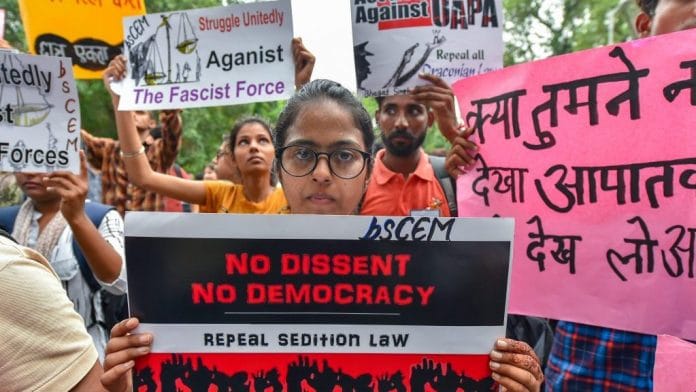
Thank you dear subscribers, we are overwhelmed with your response.
Your Turn is a unique section from ThePrint featuring points of view from its subscribers. If you are a subscriber, have a point of view, please send it to us. If not, do subscribe here: https://theprint.in/
The intolerance to listen to opposing views is creating a divide in society that threatens our pluralism
In one of the popular Netflix shows, “Sacred Games,” the character “Guruji” chants “Aham Brahamasmi,” which translates into “I am the ultimate energy.” In the show’s context, those who recite this phrase believe that they are the absolute reality. If we look around the debates that we see today, we can see a similar belief.
A belief that I am right and what I know is the ultimate truth. There is no room for putting forward a different perspective in such an environment, and it is creating an unrepairable divide within our society.
Even amidst the raging COVID-19 pandemic, we as a nation do not seem to let go of our beliefs to unite. The fraction of society that accused Tablighi Jamaat of spreading COVID-19 last year kept defending the Kumbh Mela and Bengal elections. The other side kept mum on farmers continuing their protest gathering at Delhi’s border while people in Delhi scampered to find hospital beds, oxygen cylinders, and cremation slots for their loved ones. Even on vaccination, the arguments seem to be driven by whether one likes the government or not and ignores merit.
When the Central Government procured vaccines and distributed them to states, the criticism was micromanagement and not allowing decentralization, similar to last year’s national lockdown.
As soon as the Centre gave the freedom to procure, the same advocates of decentralization were out to decide that the Centre is passing the buck and not doing its job. Unfortunately, this has been the trend for the past few years, and it hasn’t even spared institutions. Armed Forces, Judiciary, and Election Commission have taken the brunt. They have been labeled biased depending on how similar or different was their actions or decisions from our beliefs.
How did it come to this? The Economist cover story on the eve of India’s 71st Republic day argued that Prime Minister Narendra Modi and his government is stoking “divisions in the world’s biggest democracy.” Modi’s supporters have often tagged anyone asking questions as “anti-national.” But does the buck stop with Modi and his supporters?
Anyone arguing in support of governments’ policy is labeled a “bhakt.” Opinion pieces and research work are written off by discrediting the author as a “liberal” or “bhakt” without deliberating on the article’s content. In all this name-calling, people tend to listen and share opinions in an echo chamber where no one puts forward an opposing view. The absence of interaction with those of opposing views is what is creating polarization in our society. People often have strong beliefs, and the confirmation bias culminating from the similar harmonious group and media reinforces their belief to such an extent that it becomes the ultimate truth. Echo chambers foster misinformation and make it easier for political parties to distort the truth.
Dissent and diverse opinions are cornerstones of a thriving liberal democracy. But when political and ideological differences lead to polarization, sooner than later, it weakens its institutions.
And who is the winner amongst all this? For starters, majoritarianism prevails, paving the way for liberal authoritarianism. Civilized dialogue and being more tolerant of opposing views are imperative if we want to retain India’s pluralism.
These pieces are being published as they have been received – they have not been edited/fact-checked by ThePrint.


COMMENTS